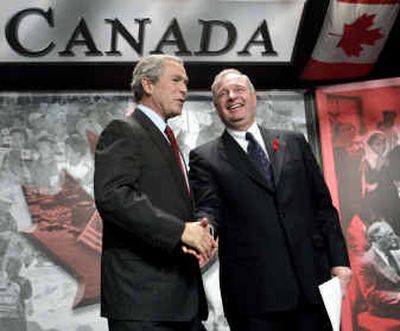Bush focuses on friendship

HALIFAX, Nova Scotia – President Bush used humor, flattery and a bit of scolding Wednesday to try to convince Canadians that the traditional friendship between their nation and the United States is more enduring than the recent discord.
In a speech here during his first official visit to this nation, Bush gave no ground on the issue of whether the United States should have invaded Iraq, a war that Canada refused to support militarily.
But he tried to smooth over the conflict by acknowledging that for Canada, with one-tenth the population and economy of the United States, “it’s not necessarily easy to sleep next to the elephant.”
“Sometimes, our laws and our actions affect Canada every bit as much as they affect us, and we need to remember that. And when frustrations are vented, we must not take it personally.” Bush said, apparently referring to his testy relationship with former Canadian Prime Minister Jean Chretien.
“As a member of Canada’s Parliament said in the 1960s, ‘The United States is our friend, whether we like it or not,’ ” Bush added. “When all is said and done, we are friends – and we like it.”
To underscore his goodwill, Bush offered a joke or two. He outlined a vision of “two prosperous, independent nations joined together by the return of NHL hockey.” And he recalled that during his first presidential campaign, a Canadian reporter slyly asked whether he welcomed the endorsement of a prime minister named “Jean Poutine.” Poutine is a traditional, if oft-derided, dish from Quebec made from potatoes and cheese curds.
“I really only have one regret about this visit to Canada,” Bush told an audience at Halifax’s Pier 21, a museum that commemorates the landing site for generations of Canadian immigrants. “There’s a prominent citizen who endorsed me in the 2000 election, and I wanted a chance to finally thank him for that endorsement. I was hoping to meet Jean Poutine.”
The audience roared appreciatively.
Bush’s two-day visit to Canada was aimed at defusing lingering tensions in relations with America’s northern neighbor. However, protests in Ottawa on Tuesday and a smaller one in Halifax on Wednesday illustrated that at least some Canadians are not ready to let bygones be bygones during his second term.
For the most part, Bush’s gestures were atmospheric, not substantive. He did not offer a quick end to a U.S. ban on imports of live Canadian cattle. He announced the intent to – but no concrete steps toward – resolving a decades-old dispute over U.S. tariffs on Canadian lumber, which the World Trade Organization has repeatedly ruled illegal.
On the issue of missile defense, his remarks were likely to raise some hackles among his hosts. Despite an agreement not to mention the subject, Bush repeatedly referred publicly to U.S. plans to build a North American missile defense system.
“I hope we’ll also move forward on ballistic missile defense cooperation to protect the next generation of Canadians and Americans from the threats we know will arise,” Bush said at one stop.
The Canadian public generally opposes missile defense, which is seen as a step toward militarizing space. All the same, current Prime Minister Paul Martin acceded during the summer to a U.S. request that the joint U.S.-Canadian early warning system known as NORAD take a role in developing the U.S. system.
Bush’s remarks forced Martin to defend that decision.
“In terms of putting weapons in space, we have no intention of getting involved in any program that would do that,” Martin insisted during a news conference in Halifax.
And on Iraq, Bush reached back to World War II and quoted the words of a former Canadian Prime Minister McKenzie King to chide Canadians for what he considered their failure to understand the danger posed by Saddam Hussein’s regime.
“The prime minster (said), ‘We must also go out and meeting the enemy before he reaches our shores. We must defeat him before he attacks us, before our cities are laid to waste,’ ” Bush said. “McKenzie King was correct then, and we must always remember the wisdom of his words today.”
Bush turned down an invitation to address Parliament in Ottawa, where he might have faced heckling. Instead, he added a second day to his visit to travel to this Atlantic port, which has close ties to New England, to highlight themes of friendship.